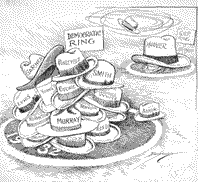
![]()
![]()
Introduction
----
How to Use
this Guide
----
Program
Descriptions
----
Previewing
Questions
----
Postviewing
Activities
----
Discussion
Questions
----
Enrichment
Activities
----
Student Page
----
Related
Resources
----
Credits
- In Part I of the series we see competing candidate training sessions conducted by the Christian Coalition and the Gay and Lesbian Victory Fund. For groups like these it is never too late to recruit successful candidates of tomorrow. Look at the tactics and messages given by both groups. Do you see any similarities? Give specific examples.

- Hank Sheinkopf, a tough-talking media consultant, compares political campaigning to fighting a war. Congressional candidate Maggie Lauterer says that she is the quarterback playing on a team. Ask students what general conclusion they draw about political campaigns based on the common elements of their analogies? What other analogies can you come up with to describe campaigning for public office?
- How do visual images shape a positive or negative view of a candidate? Find examples from the series that reinforce your point of view.
- What is the difference between "retail politics" and "wholesale politics"? Which do you think would work better and why?
- In the cases of the ward boss in Chicago and the mayor in Providence, Rhode Island, American politics does not always follow a neat and orderly set of rules. What other examples from the series demonstrate this point?
- Ask students to comment on this statement by Buddy Cianci, mayor of Providence, Rhode Island: "I would attend the opening of an envelope." What do you think he meant by this? What does this comment say about the political personality of this candidate?

As the Presidential Primaries Open Up, Clifford Berryman - In the program Maggie Lauterer's campaign manager said he hoped she wouldn't develop some of the characteristics necessary to win. What do you think this means?
- Media consultant Hank Sheinkopf says:
"I have a lot of clients who are squeamish but most of them ain't in office anymore. You have to force the action. That is what this business is about. It's about combat. And the only way power exceeds is when you beat it to death. Power doesn't give up anything. My business is holding on to power for people who know how to use power. In that context the only way you win is by combat. This is a war. Somebodys got to avenge this. I'm the avenger."
What do you think of Sheinkopf and his tactics? Would you hire him if you were a candidate? Why or why not?
- The Shackman decree was a Chicago law, designed to stop the federal government from hiring and firing people on the basis of politics. Why was this decree needed? What advantage is it for incumbents to have city workers working for their reelection? Why does this decree seem ineffective now?
- Ask students why is it that Maggie Lauterer started to rise in the polls only when she went "negative." Is it true that Americans respond much more to negative campaigning than to a straightforward discussion of the issues? Why?
- Ask students to comment on this statement:
When asked whether issues are important to a campaign, a Chicago politician said, "Talking about issues. The good ones and the bad ones. The weak ones and the strong ones. The vote getters and the nonvote getters, and all that. You take all the issues and give them to the other guy. Give me a devil to beat."
- Maggie Lauterer lost in her bid to win a Congressional seat and chose not to run again in 1996. Ask students to write a brief essay describing why you think she did not fulfill her promise "to fight again."